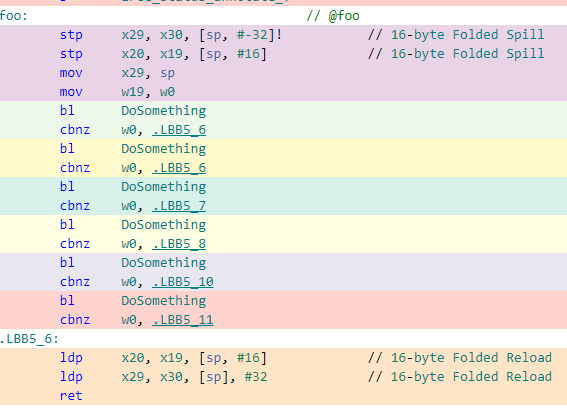| commit | 14257a619ffec02d02a618aeceac4786c09d36b5 | [log] [tgz] |
|---|---|---|
| author | Scott Todd <scotttodd@google.com> | Mon Aug 17 16:52:31 2020 -0700 |
| committer | GitHub <noreply@github.com> | Mon Aug 17 16:52:31 2020 -0700 |
| tree | 9dbccdb029383c54e52d927fadc14a3c067329c9 | |
| parent | 04925e2fd15d41fdad507305afbfdfcf1bc1076e [diff] | |
| parent | 3addfc9296abc465541543a12c632ab24afda916 [diff] |
Reworking iree_status_t/iree::Status and improving error messages across the VM (#2849) This fixes #265 by implementing the described iree_status_t behavior and changing Status/StatusBuilder/StatusOr to wrap it. By doing this I was able to remove quite a bit of gunk that was required to move between the Google-style C++ Status and the API (such as ToApiStatus/FromApiStatus). By being able to integrate iree_status_t into the C++ types I was also able to unify all of the macros - so IREE_CHECK_OK and IREE_RETURN_IF_ERROR can take either iree_status_t or Status/etc. Because the behavior is now different we can no longer use the iree/base/google/ versions and as such I've renamed all macros such that there are no collisions with the non-IREE versions. Now, IREE_CHECK_OK/IREE_RETURN_IF_ERROR when used in C code can take optional printf-style arguments to add annotations to results, for example: `IREE_RETURN_IF_ERROR(OtherFunc(...), "with a value: %d", 5);` When used in C++ the macros still accept printf-style arguments but can also use the ostream style: `IREE_RETURN_IF_ERROR(OtherFunc(...)) << "with a value: " << 5;`. Though it's supported one shouldn't mix them! The most interesting changes in this branch are in iree/base/api.h + iree/base/api.c and the iree/base/internal/status* files. Other changes are mechanical cleanups required to avoid name conflicts, enable C compilation of core parts (or code to be used both in C and C++), and removing abseil deps from files that are C compatible. A lot of focus was put on keeping the status usage - even if source location, messages, and stack traces are attached - from increasing codesize or overhead when on the happy success path. https://gcc.godbolt.org/z/xGsPc3 For example, this chain of calls and checks:  Ends up as the minimal possible code (while still having any kind of success checks):  The error handling cases are moved out of the way and (hopefully) kept out of cache. The handlers are able to hit the tail call optimization happy path and keeps the whole function code size smaller: 
IREE (Intermediate Representation Execution Environment, pronounced as “eerie”) is an MLIR-based end-to-end compiler that lowers ML models to a unified IR optimized for real-time mobile/edge inference against heterogeneous hardware accelerators. IREE also provides flexible deployment solutions for the compiled ML models.
IREE is still in its early phase. We have settled down on the overarching infrastructure and are actively improving various software components as well as project logistics. It is still quite far from ready for everyday use and is made available without any support at the moment. With that said, we welcome any kind of feedback on any communication channels!
For development, IREE supports both Bazel and CMake on Windows and Linux. We are working on enabling macOS support. For deployment, IREE aims to additionally cover Android and iOS.
Please see the Getting Started pages on IREE's documentation hub to configure, compile, and run IREE in your favorite development environment!
IREE hosts all its documentation and project status dashboards on GitHub Pages. We are still building up the website; please feel free to create issues for the documentation you'd like to see!
We also have some public talks that explain IREE's concepts and architecture:
IREE adopts a holistic approach towards ML model compilation: the IR produced contains both the scheduling logic, required to communicate data dependencies to low-level parallel pipelined hardware/API like Vulkan, and the execution logic, encoding dense computation on the hardware in the form of hardware/API-specific binaries like SPIR-V.
The architecture of IREE is best illustrated by the following picture:
Being compilation-based means IREE does not have a traditional runtime that dispatches “ops” to their fat kernel implementations. What IREE provides is a toolbox for different deployment scenarios. It scales from running generated code on a particular API (such as emitting C code calling external DSP kernels), to a HAL (Hardware Abstraction Layer) that allows the same generated code to target multiple APIs (like Vulkan and Direct3D 12), to a full VM allowing runtime model loading for flexible deployment options and heterogeneous execution.
IREE aims to
IREE is still at its early stage; we have lots of exciting future plans. Please check out the long-term design roadmap and short-term focus areas.
We use GitHub Projects to track various IREE components and GitHub Milestones for major features and quarterly plans. Please check out for updated information.
| CI System | Platform | Build System | Component | Status |
|---|---|---|---|---|
| Kokoro | Linux | Bazel | Core | |
| Kokoro | Linux | Bazel | Bindings | |
| Kokoro | Linux | Bazel | Integrations | |
| Kokoro | Linux | CMake | Core + Bindings | |
| Kokoro | Android | CMake | Runtime (build only) |
IREE is licensed under the terms of the Apache license. See LICENSE for more information.